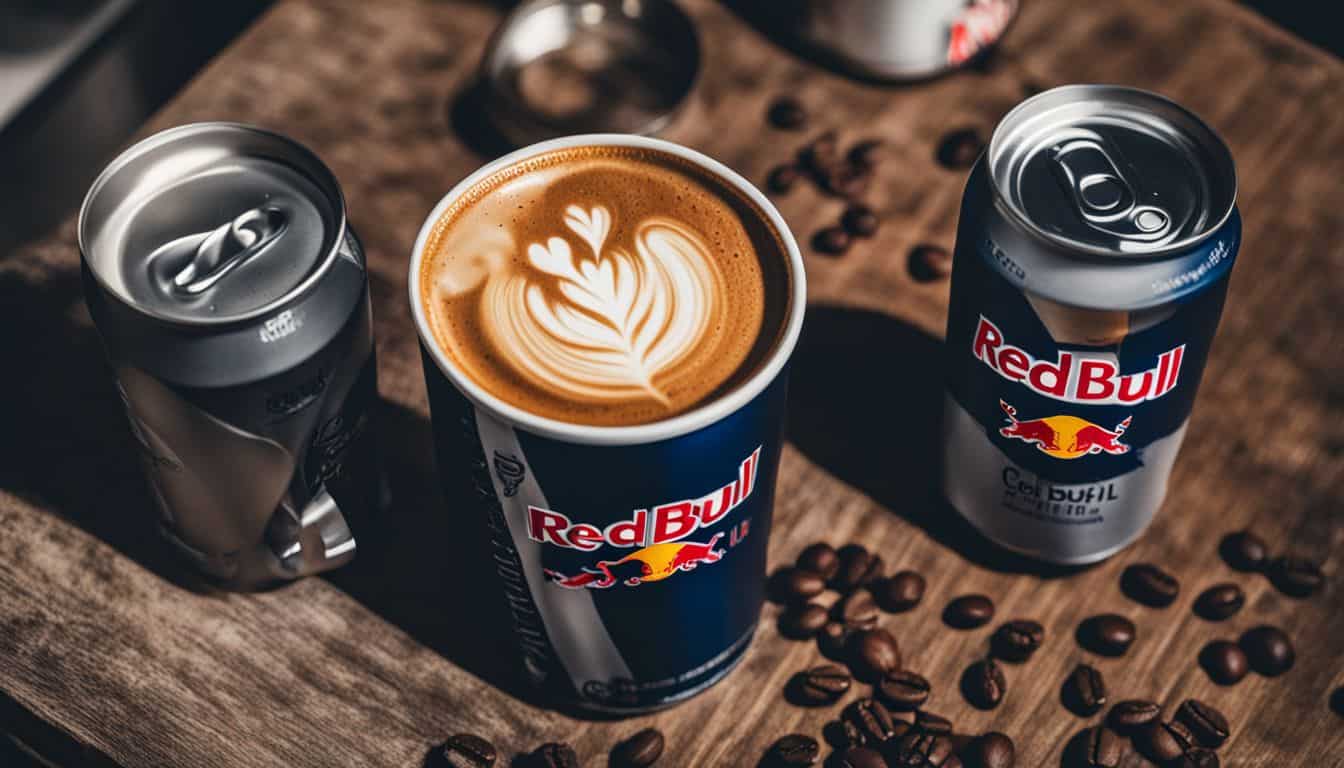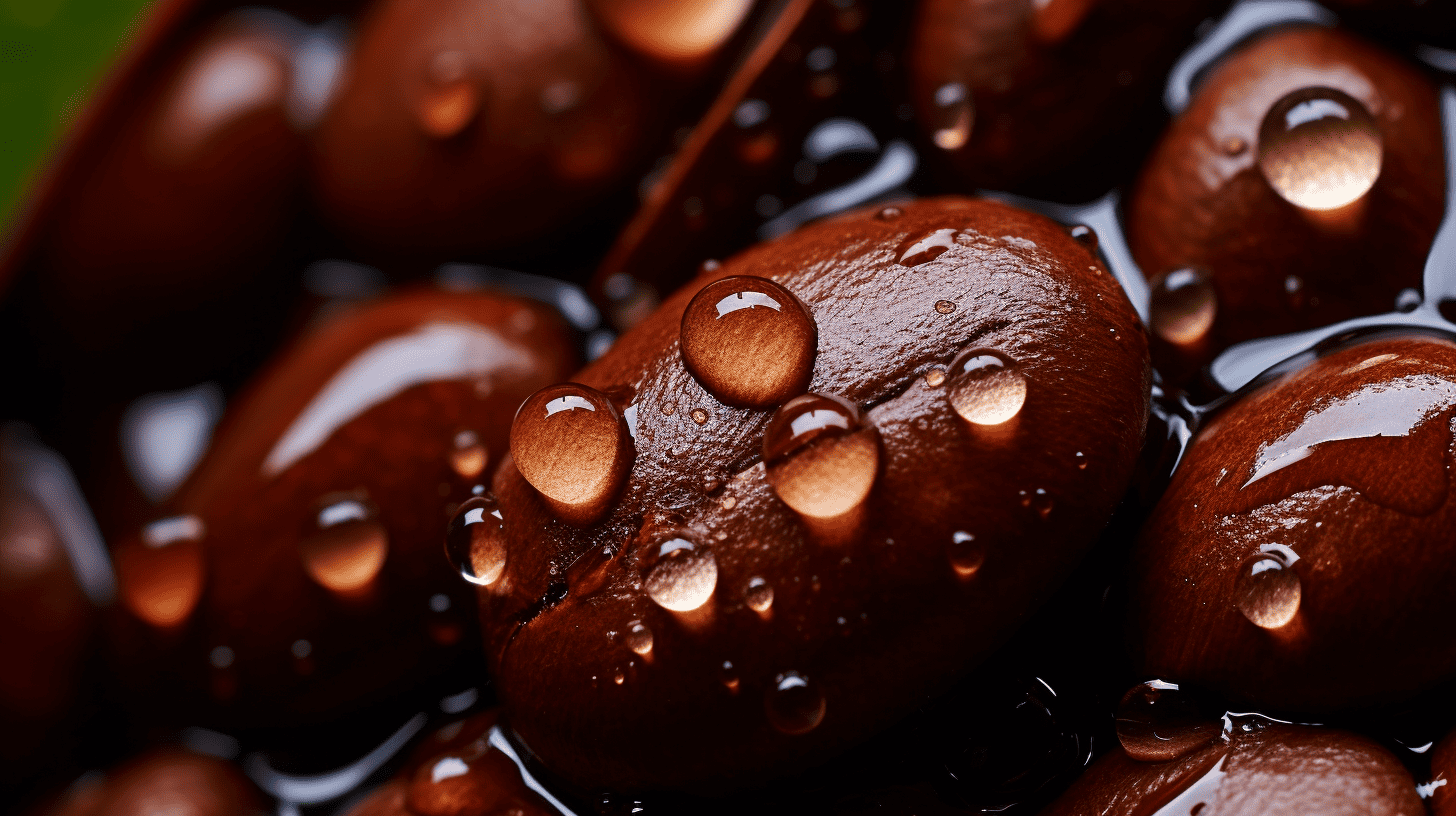Are you struggling to decide between a steaming cup of coffee vs Red Bull for your morning boost? Trust me, I’ve been there too. Having researched the nutritional benefits and health effects myself, did you know that a typical can of Red Bull contains about 80mg of caffeine while an 8 oz cup of drip coffee has 110-150mg? In this blog post, we’ll dive into comparisons between these two popular stimulants and discuss everything from caffeine content to potential health impacts.
Let’s get caffeinated!
Key Takeaways
- Coffee contains more caffeine than Red Bull, with an 8 oz cup having 110-150mg compared to Red Bull’s 80mg per can.
- Coffee provides antioxidants that protect against damage from free radicals, while Red Bull gives a good amount of B vitamins for energy production and overall health.
- Both coffee and Red Bull have their benefits and risks, so it’s important to consume them in moderation. Excessive caffeine intake can lead to negative effects such as sleep disturbances and increased heart rate.
- When choosing between the two beverages, consider factors like caffeine content, nutritional value, personal preference, carbonation preferences, calorie count, and the importance of moderation.
Nutritional Comparison of Coffee and Red Bull
Here is a table comparing the nutritional content of coffee and Red Bull based on the information from the search results:
| Nutrient | Coffee | Red Bull |
|---|---|---|
| Calories | 2.4 per cup | 110 per 8.4 fl.oz can |
| Sugar | 0g per cup | 27g per 8.4 fl.oz can |
| Protein | Not mentioned | 1g per 8.4 fl.oz can |
| Fat | 0.1g per cup | 0g per 8.4 fl.oz can |
| Caffeine | 95mg per 8 fl.oz cup | 80mg per 8.4 fl.oz can |
| Vitamins and Minerals | Contains magnesium and potassium | Contains B group vitamins |
Based on the search results, coffee has fewer calories and less sugar than Red Bull. Coffee also contains some vitamins and minerals, while Red Bull contains B-group vitamins. However, Red Bull has slightly more protein than coffee. The caffeine content of coffee and Red Bull is similar, with coffee having slightly more caffeine than Red Bull.
It is important to note that the nutritional content of coffee can vary depending on the type of coffee and if it contains any additional ingredients, such as creamers and sugar. Additionally, Red Bull and other energy drinks are often high in added sugars, which can have negative health effects if consumed in excess
Coffee and Red Bull have distinct nutritional profiles, with differences in caffeine content and other nutrients.
Caffeine content
In a single shot of espresso, you get about 63 mg of caffeine. This is less than what you find in Red Bull, which has around 80 mg per can. But drip coffee? It packs even more punch! A small 8oz cup holds between 110-150mg of caffeine.
So if it’s an energy boost you’re after, coffee might be your best bet. Just watch out for sleep problems if you have too much. Both drinks need to be enjoyed with care – they should wake you up, not keep you awake all night!
Other nutrients
Coffee and Red Bull not only differ in their caffeine content but also in terms of other nutrients. When it comes to coffee, you can enjoy the antioxidants it offers. These powerful compounds help protect your body against damage from harmful free radicals.
On the other hand, Red Bull provides a good amount of B vitamins. These vitamins play a crucial role in maintaining your overall health and energy levels. So, while coffee gives you antioxidants, Red Bull gives you B vitamins to support your well-being.
Keep these differences in mind when choosing between the two beverages for an added nutritional boost!
Health Effects of Coffee
Coffee can offer a range of health benefits, such as improved cognitive function and reduced risk of certain diseases.
Benefits
Coffee and Red Bull have their own unique benefits. Here are some reasons why coffee is beneficial:
- Coffee contains antioxidants that may help protect against inflammation and certain diseases.
- Drinking coffee in moderation has been linked to a reduced risk of several health conditions, including type 2 diabetes, Parkinson’s disease, and liver diseases like cirrhosis.
- Coffee can increase alertness and improve cognitive function, making it a popular choice for those needing an energy boost or enhanced mental performance.
- Some studies suggest that coffee may boost metabolism and aid in weight loss.
- Red Bull contains B vitamins, which are important for energy production and overall health.
- The caffeine in Red Bull can increase alertness and improve physical endurance.
- Red Bull is often used as a quick energy source during sports or intense physical activities.
- Some people find that the carbonation in Red Bull provides a refreshing feeling.
Risks
There are some risks associated with both coffee and Red Bull. Here are a few things to consider:
- Too much caffeine from either coffee or Red Bull can lead to jitteriness, anxiety, and sleep disturbances.
- Coffee consumption has been linked to an increased risk of heartburn and acid reflux.due to its high acidity.
- Red Bull and other energy drinks have been associated with an increased risk of heart palpitations and high blood pressure.
- Excessive consumption of coffee can lead to dehydration. as it is a diuretic that increases urine production.
- Regularly consuming energy drinks like Red Bull can potentially lead to dependency and addiction.
Health Effects of Red Bull
Red Bull provides a quick energy boost due to its high caffeine content, making it popular among individuals looking for an immediate pick-me-up. However, excessive consumption of Red Bull can lead to negative health effects such as increased heart rate and blood pressure.
Benefits
Coffee:
- Provides an energy boost
- Enhances mental alertness
- Contains antioxidants that can have health benefits
- May enhance physical performance during exercise
- Can reduce the risk of certain diseases like Parkinson’s and Alzheimer’s
- Provides a quick burst of energy
- Increases alertness and improves focus
- Contains B vitamins that support energy production in the body
- Can improve cognitive function and reaction time
- Gives a temporary boost to mood and motivation
Risks
There are some risks to consider when it comes to consuming both coffee and Red Bull. Here are the potential risks:
- Overconsumption of caffeine can lead to jitteriness, increased heart rate, and even anxiety.
- Regularly drinking large amounts of coffee or energy drinks may disrupt sleep patterns and contribute to sleep deprivation.
- Both coffee and Red Bull can be addictive due to their caffeine content, leading to dependency and withdrawal symptoms if consumption is suddenly stopped.
- Excessive intake of energy drinks like Red Bull has been linked to cardiovascular issues, including increased blood pressure and heart problems.
- Drinking coffee in excessive amounts can cause digestive problems such as acid reflux and stomach ulcers.
- Energy drinks like Red Bull often contain high sugar levels, which can lead to weight gain, diabetes, and dental issues.

Choosing Between Coffee and Red Bull
Consider the factors and make a decision based on your individual needs and preferences.
Considerations
When deciding between coffee and Red Bull, there are a few considerations to keep in mind. First, it’s important to consider the caffeine content. While Red Bull contains about 80 mg of caffeine per can, a cup of coffee typically has more caffeine.
This means that if you’re looking for a bigger energy boost, coffee might be your best choice.
Another consideration is the nutritional value. Coffee contains antioxidants that can have health benefits, while Red Bull provides B vitamins that are important for energy production.
So, depending on what nutrients you’re looking for, one may be more suitable than the other.
It’s also worth noting that Red Bull is a carbonated beverage and some people prefer non-carbonated drinks like coffee or tea. Additionally, if you’re watching your calorie intake, it’s important to note that Red Bull does contain calories while black coffee is almost calorie-free.
Lastly, moderation is key when consuming both coffee and Red Bull. While they can provide an energy boost and increase alertness, excessive consumption of stimulants like caffeine can lead to negative health effects such as sleep deprivation and increased heart rate.
In conclusion:
– Consider the caffeine content
– Look at the nutritional value

Moderation is key
When it comes to consuming coffee or Red Bull, moderation is key for overall health. Both drinks can provide an energy boost due to their caffeine content. However, excessive consumption of caffeine can lead to negative health effects such as increased heart rate, restlessness, and difficulty sleeping.
It’s important to be mindful of your caffeine intake and not rely on these beverages as a substitute for proper sleep or a balanced diet. Choosing smaller serving sizes or opting for decaffeinated versions can help manage your caffeine intake.
Remember to listen to your body and make choices that align with your individual needs and preferences.
Conclusion on Coffee Vs Red Bull
In conclusion, when comparing coffee and Red Bull, it’s important to consider their caffeine content, nutritional value, and health effects. Coffee offers antioxidants and is low in calories, while Red Bull contains B vitamins and provides an energy boost.
Ultimately, the choice between the two comes down to personal preference and moderation.
Which Has More Caffeine, Cappuccino or Regular Coffee?
When it comes to the cappuccino vs coffee caffeine comparison, regular coffee generally contains more caffeine. While cappuccino is made by combining equal parts espresso, steamed milk, and milk foam, its overall caffeine content is lower due to the milk dilution. Conversely, regular coffee is brewed with hot water, resulting in a higher caffeine concentration.
FAQs on Coffee Vs Red Bull
1. Is coffee or Red Bull a better choice for energy?
Both coffee and Red Bull can provide a temporary boost of energy, but coffee is often considered the healthier option due to its lower sugar content and natural compounds that offer additional health benefits.
2. How much coffee or Red Bull should I consume for an energy boost?
It is recommended to consume moderate amounts of caffeine for an energy boost: around 1-2 cups of coffee (8-16 ounces) or one can of Red Bull (8.4 ounces).
3. Are there any side effects from consuming too much coffee or Red Bull?
Consuming excessive amounts of caffeine from either source can lead to side effects such as increased heart rate, jitteriness, anxiety, and difficulty sleeping.
4. Can I drink both coffee and Red Bull in moderation?
Drinking both coffee and Red Bull in moderation is generally safe for most individuals; however, it’s important to be mindful of your overall caffeine intake and listen to your body’s response to avoid overstimulation or negative side effects.





Leave a Reply